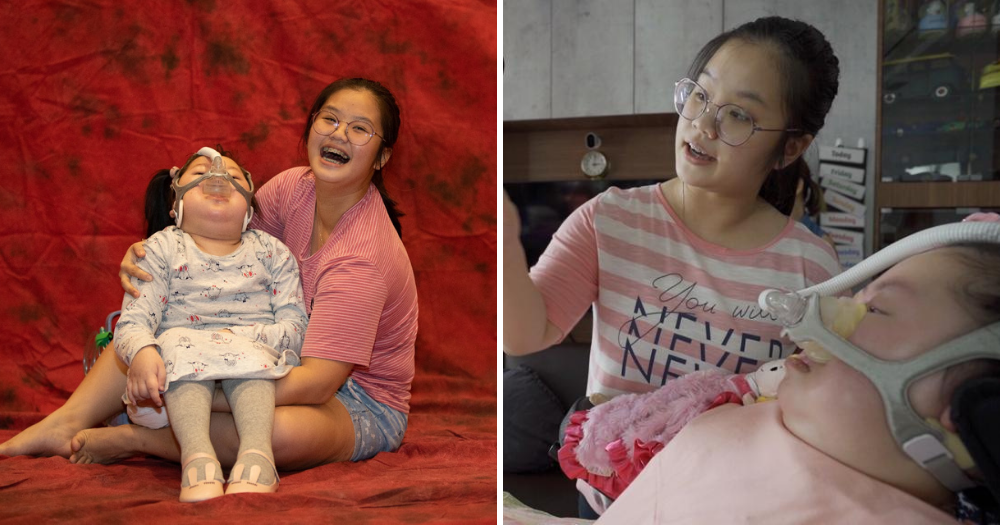Amanda and Amelia Ng couldn't be more different as sisters. Amelia, 14, loves fashion, dressing up, and having her hair done up nicely. 17-year-old Amanda, on the other hand, prefers comfort to frills.
And while this may seem like a regular sisterly relationship, the two have a very different relationship dynamic from most other siblings for one very important reason: unlike most other 14-year-olds, Amelia is bedridden and cannot speak, eat, or blink.
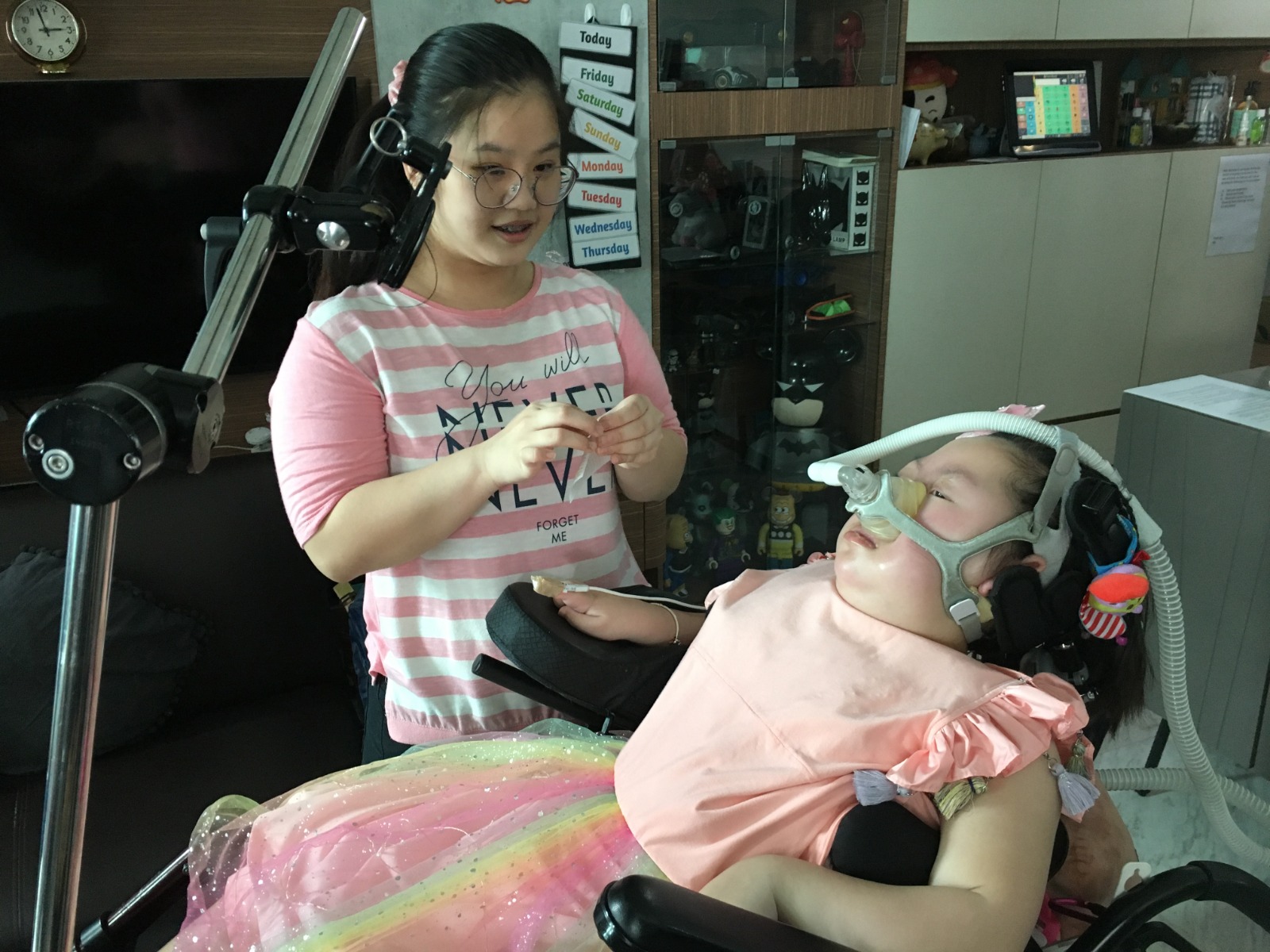 Amanda (left) and Amelia (right). Photo by Zenn Tan.
Amanda (left) and Amelia (right). Photo by Zenn Tan.
Began degenerating at two years old
Amelia was born a healthy and "normal" baby, the girls' mother Wendy Loh explains.
When Amelia was about eighteen months old, Wendy realised that something was off, as she was unable to do many things that other children her age could do.
Amelia slowly lost her ability to stand, sit, speak, eat, blink, urinate, and even breathe sometimes. Her condition stumped her doctors and more than a decade later, they still don't know exactly what her condition is, classifying it generally as a degenerative mitochondrial disorder.
Amelia's diagnosis devastated Wendy and her husband Kin Nam, who had no idea where to turn to for community and support.
"At one point, I actually wanted to..." Wendy pauses, looking down, seeming to consider her words.
Her voice breaks slightly with emotion as she finishes her sentence: "...to actually end my life. I couldn't face how her condition was. I had no one to talk to."
The turning point for Wendy came when Amelia was four, and she suffered from a bout of epilepsy. The doctor said that she needed to be treated, or else her prognosis would be very short.
"At that point, I was crying in the ward. And I told myself, I'm going to live to the fullest, and I'm going to give her the quality of life that I can."
Amelia wasn't like other friends' siblings
Amanda was only about five years old when Amelia's condition began deteriorating.
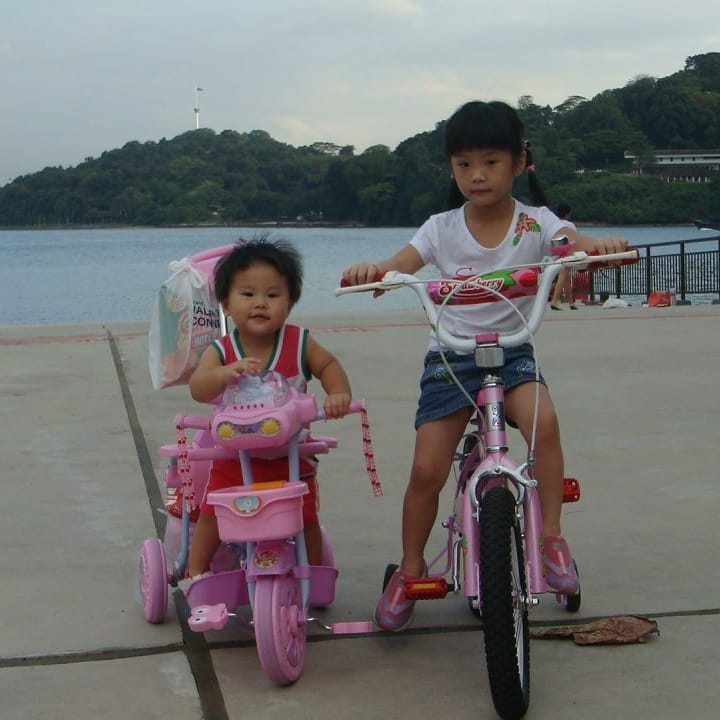 Amelia (left) and Amanda (right), around ages two and seven, respectively. Photo via Instagram / @_amanda_jewell_.
Amelia (left) and Amanda (right), around ages two and seven, respectively. Photo via Instagram / @_amanda_jewell_.
While she was too young to completely understand what this meant, Amanda understood that Amelia was different from her friends' siblings.
"I'd see that some of my friends would have their younger siblings coming into school with them. But for me, I knew deep down that Amelia would never go to the same primary school as me.
It affected me at one point, because [it felt like] it's not fair that I have a sibling that is not 'normal'. I think everyone, as a child, would want someone to play with."
However, as Amanda got older, she learned more about Amelia's condition and grew to understand and love her sister for all that she is.
"She's not just a disabled child who's confined to her wheelchair, confined to her bed, unable to express herself. But Amelia is full of joy and excitement. She's full of character."
Speaking Amelia's language
At this point, you might be wondering: How does Amanda know all of this about her sister, if Amelia doesn't have the ability to speak or move?
From the perspective of people who don't know Amelia, she appears non-communicative. It seems impossible to know what she is feeling or thinking, or what her personality is.
But this is where we're wrong, Amanda says, explaining that Amelia communicates on a "whole different level":
"For us we express ourselves through words and through our gestures, but for Amelia, she communicates just with her eyes.
When you look into her eyes and you fully understand her, you'll be able to tell that she can show us so much more potential that she has in life."
Amelia's eyes allow her to communicate through the use of a machine that tracks her eye movement, allowing her to communicate in words and even sentences.
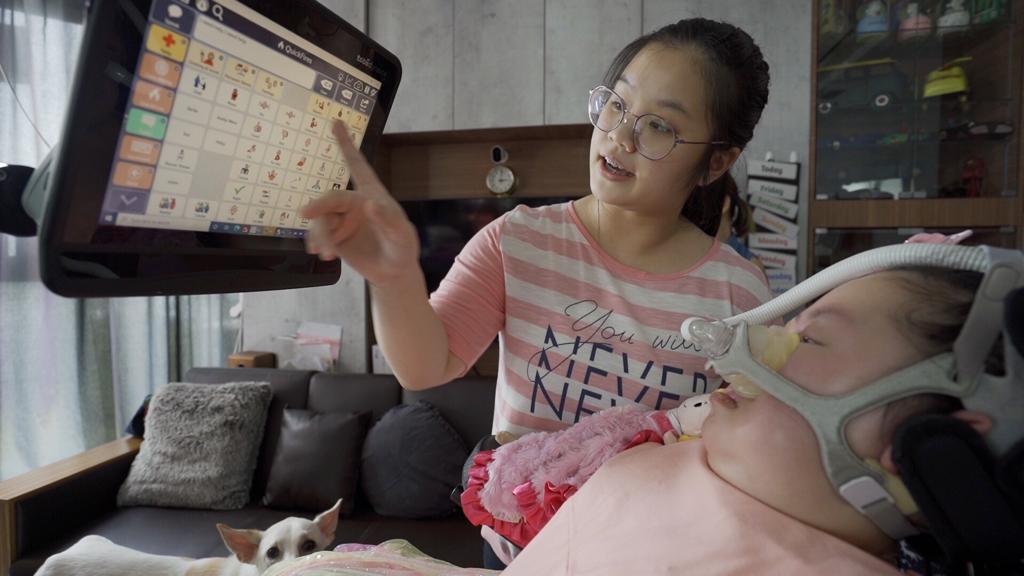 Amanda helping her sister communicate using the machine. Photo by Zenn Tan.
Amanda helping her sister communicate using the machine. Photo by Zenn Tan.
Here's a video from the sisters' Facebook page of Amelia using the machine to wish her doctor a happy birthday, and even using her eyes to open up Google Assistant in order to "sing" happy birthday.
Amelia's use of the machine to communicate demonstrates that she has a high-functioning brain, says Amanda:"I always say that God is very fair. So even though she has a disability, she's extremely smart."
Decision to be homeschooled
It is clear that Amanda shares a close bond with her sister.
In fact, they are so close that Amanda requested to be homeschooled when she was in Secondary 2, in order to spend more time with Amelia.
At first, Wendy and Kin Nam were not supportive of Amanda's desire to be homeschooled. They felt that it added more uncertainty — this time, for Amanda's future — to their already-uncertain situation with Amelia and her life-limiting condition.
Wendy's mind changed, however, when Amanda said to her: "We know that we have not much time with Amelia."
"When she said that, as a mum, it kind of broke me," Wendy admits.
Amanda has been homeschooling for three years now. I ask her if she feels that she's missing out on the "normal" teenager life and she replies confidently:
"I don't really think I'm missing out anything, because I think my life is already full of adventures of Amelia. Like, every single milestone that she makes is much more than anything I expect in my life."
The two sisters spend a lot of time together, watching TV — Amelia's favourite show is PJ Masks — going to the park, playing with bubbles on their balcony, and talking.
"I love talking to Amelia. She's a girl with so much character and so much joy," Amanda beams.
"She just jokes around, and sometimes she'll ask me, 'Jie jie (older sister), come here.' And then she'll be like, 'Just kidding!'. So, you know, she'll do all this weird, strange stuff, and it just makes her who she is."
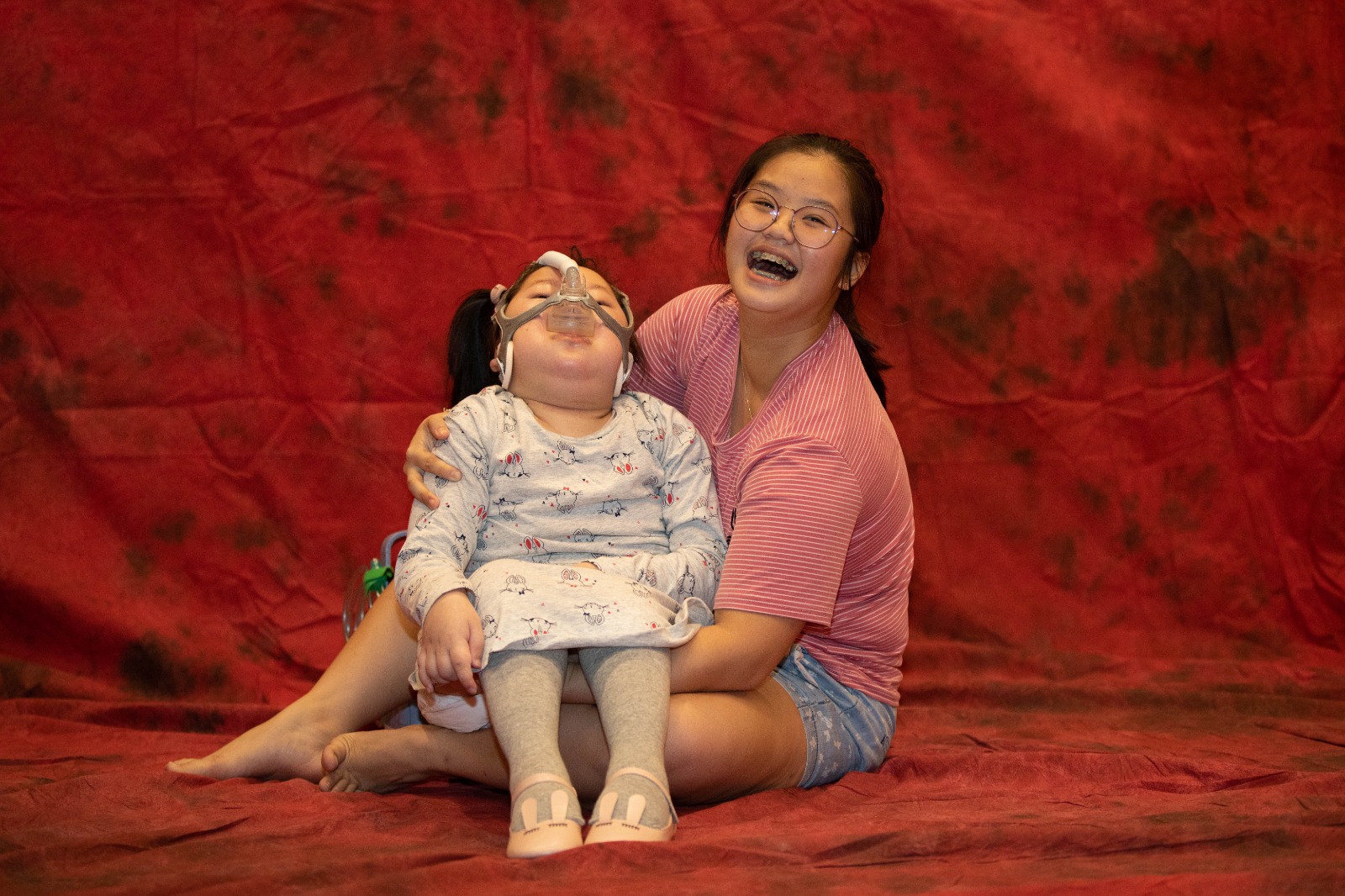 Photo courtesy of HCA Hospice Care.
Photo courtesy of HCA Hospice Care.
"There's so much joy when I'm around her, and this joy that I have with her is not to be compared with any other joy that I have with my friends. It's a totally different level." Amanda says emphatically.
Wendy and Kin Nam have also made sure that neither Amanda nor Amelia miss out on life experiences, even bringing them on overseas holidays to places like Gold Coast and Perth, making special arrangements to bring Amanda's bed and wheelchair along.
Everyday difficulties
Despite the joy that Amelia brings to everyone around her, the family still faces everyday difficulties that come along with Amelia's condition.
For example, both Amanda and Wendy's schedules are very much dictated by Amelia's needs.
There's also the physically laborious task of carrying and shifting Amelia regularly, so that she can be comfortable and doesn't develop bed sores.
Simple bodily functions like passing urine, which many of us take for granted, are things that Amelia's body is unable to do due to the degeneration. Thus, the family must assist her in clearing her bowels four times a day.
Amelia is also unable to eat, so she is fed five times every day.
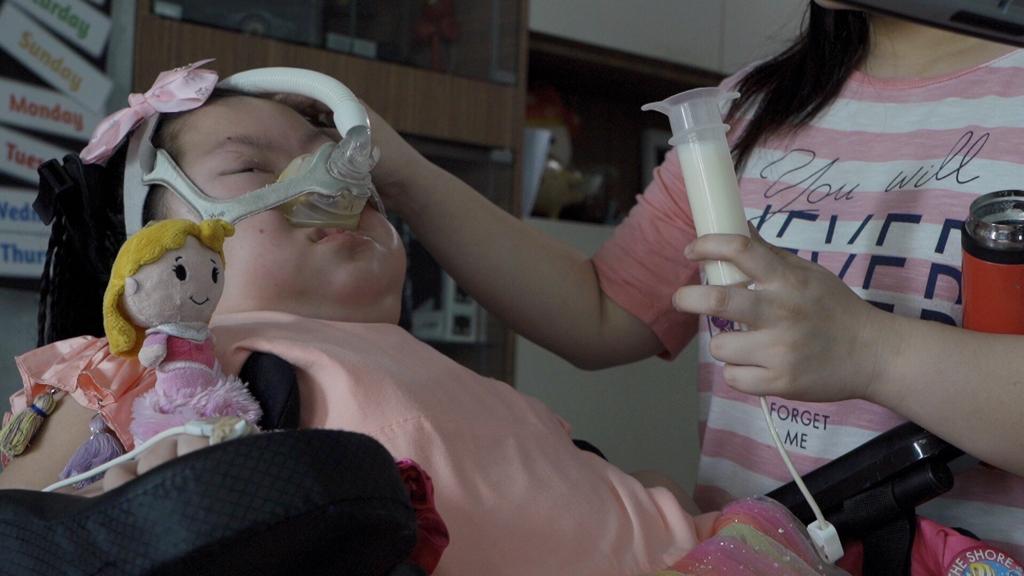 Amanda feeding Amelia through her tube. Photo by Zenn Tan.
Amanda feeding Amelia through her tube. Photo by Zenn Tan.
But perhaps the greatest difficulty faced by the Ngs is that they never know when Amelia's situation will suddenly worsen.
In 2018, a flu landed Amelia in the intensive care unit (ICU) because of her weak immune system. In order to save her life, she needed to be intubated, a difficult and risky procedure for those suffering from a degenerative disorders.
The decision to intubate Amelia was a heart-wrenching one, especially for Wendy, who chokes up and holds back tears as she recalls the moment.
Thankfully, it went well, and Amelia was able to recover from the incident.
These difficult and scary moments have also brought the family together and made the family stronger, says Wendy.
"Through these episodes, through these days that we never thought we'd have to go through, we learn to be brave, like what Amelia did.
Because every time we try to bring her back, she was willing to fight the battle together.
And because of that, our family learned that every moment is so precious. Every breath is so precious. And we never take any minute of her life for granted anymore."
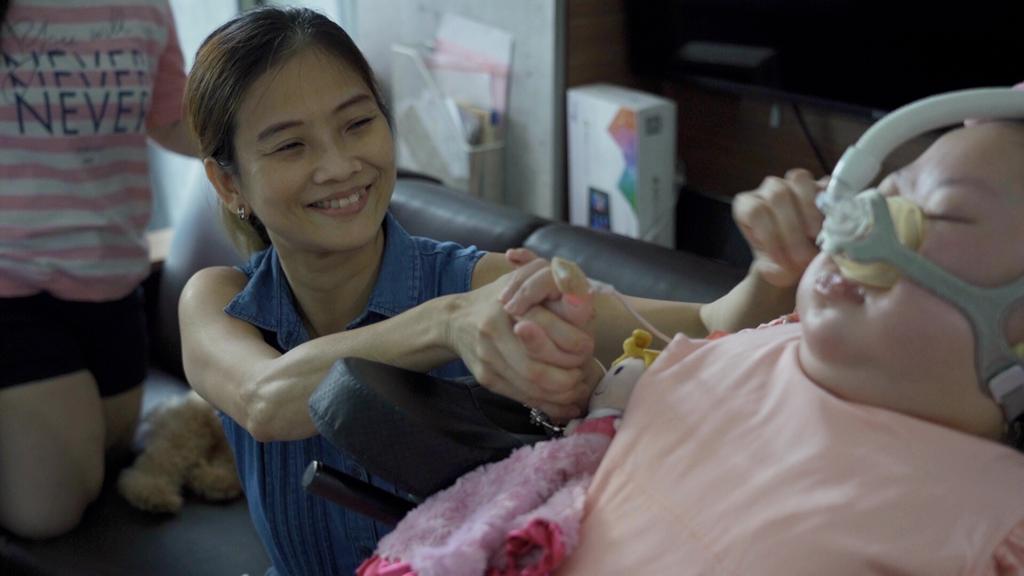 Photo by Zenn Tan.
Photo by Zenn Tan.
Finding support in caregivers and other families in similar situations
Today, the Ng family has come a long way since those early days of loneliness and despair.
Although Amelia's condition continues to deteriorate, the family has found strength in one another, in Amelia's tenacity, and in the robust support they have received from HCA Hospice Care, where Amelia has been receiving care since she was six.
Amelia is part of the HCA Hospice Care's Star PALS (Paediatric Advanced Life Support) programme, a palliative care programme aimed at improving the quality of life of children like Amelia, who live with life-threatening or life-limiting conditions.
Care has not only been provided for Amelia's medical needs, but also emotionally, for the whole family, Wendy explains.
Through Star PALS, the Ngs have found a supportive community comprising other families in the programme.
Star PALS organises regular events to bring the families together for outings, where they get to enjoy a respite while nurses take care of their children.
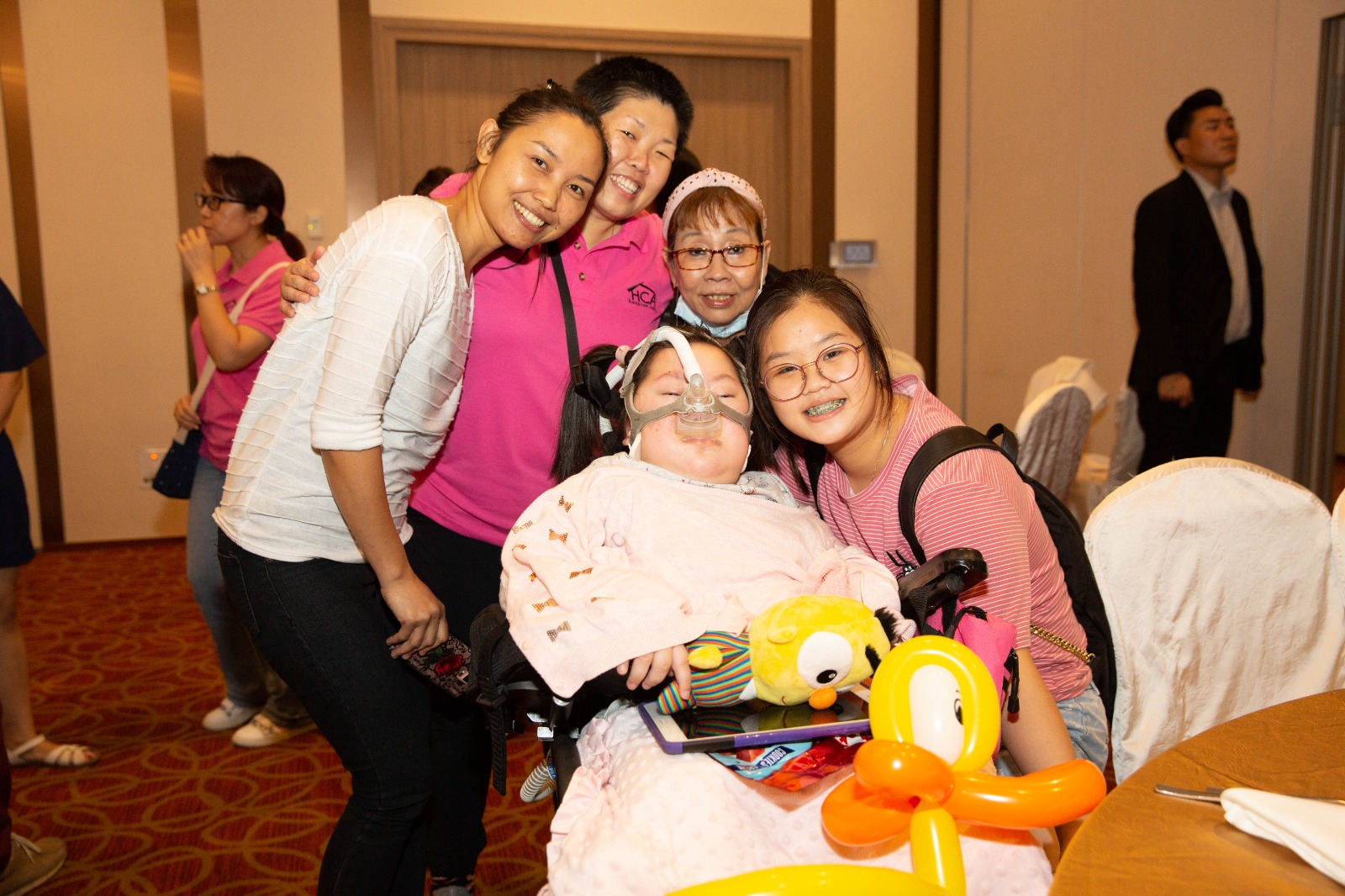 Amelia and Amanda with Amelia's nurse, Ya Nee (in the pink polo shirt) at Star PALS Family Camp 2019. Photo courtesy of HCA Hospice Care.
Amelia and Amanda with Amelia's nurse, Ya Nee (in the pink polo shirt) at Star PALS Family Camp 2019. Photo courtesy of HCA Hospice Care.
Drawing from own experience, Amanda also plans activities for siblings of kids in the programme so that they "know that they're not alone in this journey."
Poh Ya Nee, a Senior Palliative Care Nurse with Star PALS, has also been a huge support to the Ng family over the past three years she has worked with Amelia, paying them house visits at least once per month in order to make sure that Amelia is comfortable.
"My journey with the family really showcases [what] palliative care [is about]. In a way, palliative care is not about dying. It's really about living a good life.
Because everybody will die eventually. If you acknowledge it and accept it, then you'll start to live a meaningful life."
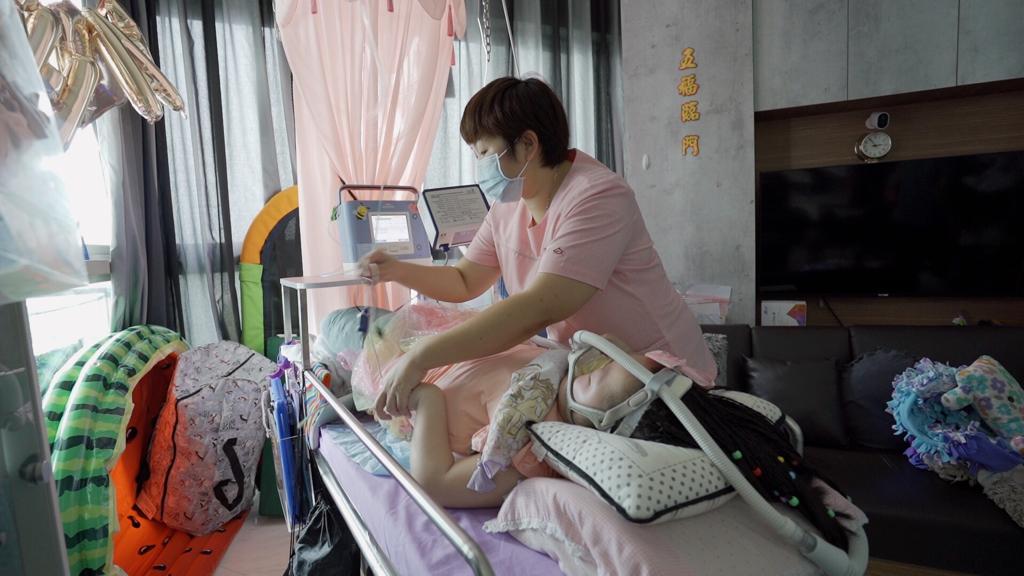 Ya Nee with Amelia. Photo by Zenn Tan.
Ya Nee with Amelia. Photo by Zenn Tan.
Her work is not just about taking care of her patients medically, but also about supporting patients' families through the process of making decisions for their children:
"I always tell the families, there's no 'correct' way of doing things. But what is the best way? The decision that you make that you will not regret in the future, lah.
[...]
That's why we say, they will do whatever they need to do. If in any situation, they fall, Star PALS will be there to catch them."
The path forward
For the Ng family, every day that they have been able to spend with Amelia has been a gift, and something they do not take for granted.
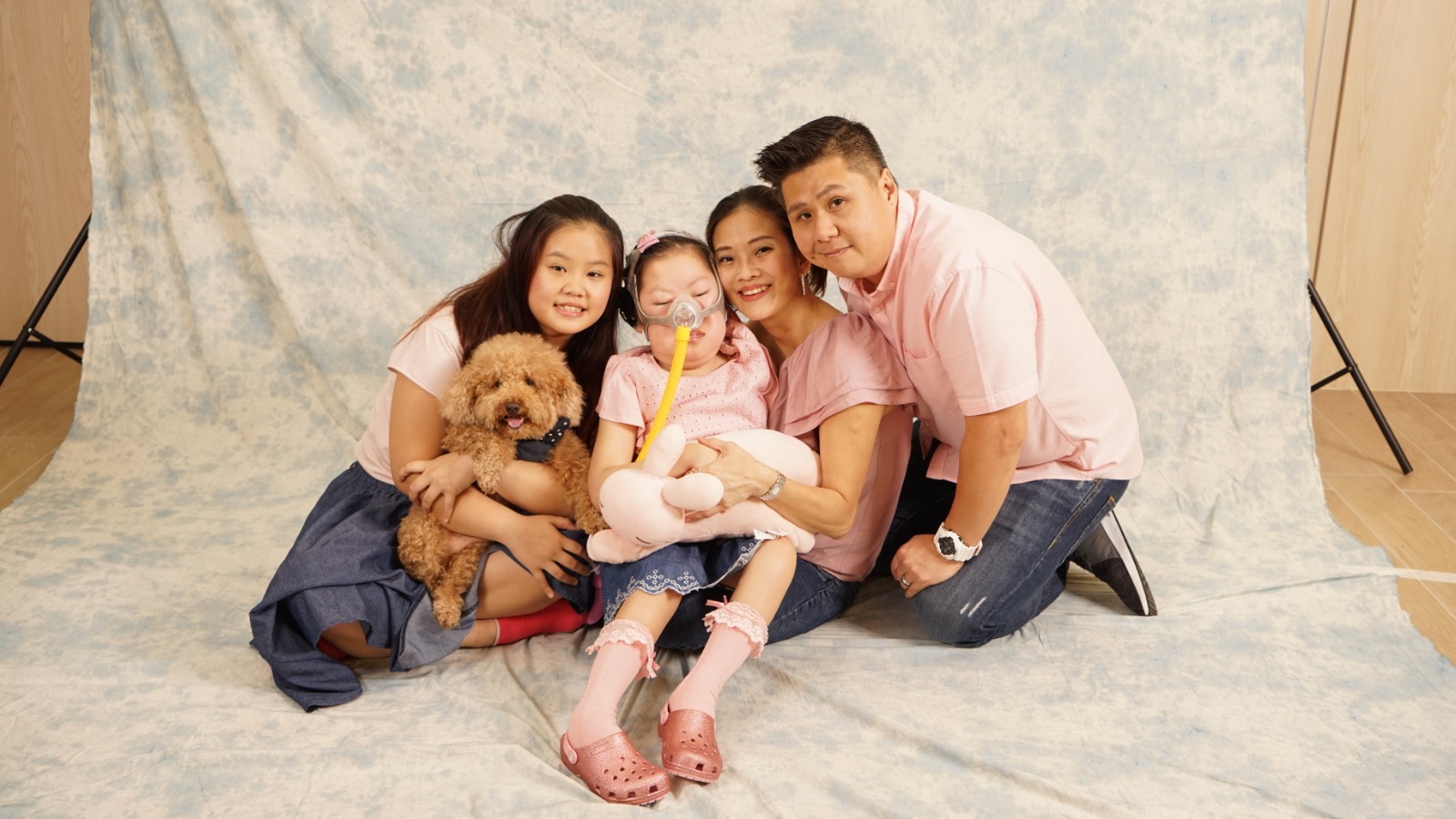 Photo courtesy of HCA Hospice Care.
Photo courtesy of HCA Hospice Care.
In June this year, Amelia's condition took a turn for the worse; her body was unable to maintain her blood pressure and heart rate at night.
Doctors said then that she wouldn't make it, but miraculously, she survived the episode.
Recently, Amelia has also been finding it increasingly difficult to be propped up and moved around.
Amelia's condition has come to a point where there is not much more that doctors can do for her, Amanda says frankly.
"She's actually a living miracle. Amelia has proven the medical team wrong, that she's able to fight through, she's able to make it, and she's able to achieve what she wants, and she wants to spend much more time with us here on earth."
Future plans
Amanda is finishing up her last year of high school now (the equivalent of the second year of Junior College), and is thinking of applying to a local university — the National University of Singapore — because she does not want to be away from her family.
When I ask about her future plans, and if she will ever consider living overseas, Amanda responds with a lesson she has learned from Amelia:
"I say, just let nature take its course. Whatever comes will come. Whatever God wants for me, it'll come.
I think for me, it's just living in this moment, at this time, that I really want to focus on. And I don't want to think so much about the future, because the future is something we think about next time."
For now, what Amanda wants to focus on is spending time with Amelia.
She also hopes to use Amelia's life to educate others about her unique condition, as well as special needs in general:
"I really want the public to know that these kids, even though they're disabled — they are labelled with a word 'disabled' all over — in life, they can achieve so much more.
They can bless others in their very own special way, that even us as 'normal' humans, we are unable to even do it because they are just so special."
"Amelia is just a rare golden diamond," Amanda says joyfully, like the proud older sister she is.
Stories of Us is a series about ordinary people in Singapore and the unique ways they’re living their lives. Be it breaking away from conventions, pursuing an atypical passion, or the struggles they are facing, these stories remind us both of our individual uniqueness and our collective humanity.
Totally unrelated but follow and listen to our podcast here
Some quotes have been edited for clarity. Top photos courtesy of HCA Hospice Care and by Zenn Tan.
If you like what you read, follow us on Facebook, Instagram, Twitter and Telegram to get the latest updates.
